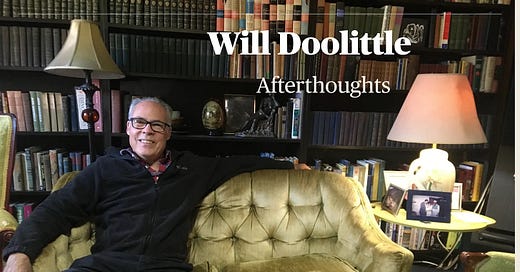Reaching the place she never wanted to be
New poodle breed introduced
Please consider supporting The Front Page with a paid subscription: HERE
Early on in the progression of her Alzheimer’s, when she could still think for herself, Bella said she did not want to reach the stage when she couldn’t care for herself.
She was very upset after a physical therapist she was seeing told her about a woman she knew who had Alzheimer’s and ran naked into the street.
She was horrified at the thought I’d have to help her someday in the bathroom.
“You’re not going to wipe my ass,” she said.
She would end her own life before it came to that, she said.
“I can just walk into the river,” she said — we live three blocks from Haviland Cove.
I am helping her with everything now, and it has been years since she has mentioned any self-destructive act.
Life is difficult for her. She begins to wander the house at 4 or 5 a.m. and her restlessness surges and recedes throughout the day, until she finally falls into sleep at about 6 p.m.
“I just want to go home,” she says, again and again, yearning for a place that doesn’t exist — a place, I think, where she can think again.
She oscillates between exhaustion and anxiety, drifting into sleep then standing up suddenly, intent on doing something, if only she could remember what.
She picks up items to relocate from a tabletop to a sideboard. She opens the front door and calls our dog, who is curled on the couch.
She pulls off her socks and her pants, because something is wrong with them.
“Come sit with me on the couch,” I say, but she hangs back, staring at me.
“Are you going to hit me?” she says.
She gets angry and sulks, tries to get out of the car at a stop sign or a red light or the Starbucks drive-thru.
“I’m sorry,” she says later, piteously.
“That’s OK, Honey.” I put my arm around her shoulders, our faces close. “It’s hard for you, I know. It’s not your fault.”
Minutes later, she’s mad again, refusing to answer me or look at me. She is a carousel of emotions; I’m along for the ride.
I stay in the moment as much as I can but wonder how long this will continue. It has been eight years, but the disease has no timeline, progressing at an unpredictable rate for a few years or 10 or 20.
Death is where she is going, but so are we all, at our own unpredictable rates.
Sometimes, she sits at the dining room table with her head in her hands, eyes half closed, a portrait of grief caught between sleep and waking.
When she pulls away from me and denies our house is her home, walks out the front door and down the sidewalk or jumps out of the car when it stops, she seems to be trying to escape her circumstances.
“I’m not a child!” she snapped at me recently.
Nonetheless, I help her dress.
In the grocery store, I reassure her about walking on the polished floor, because it looks to her like she could fall into it.
“I’m scared,” she says.
Deep inside her is the person who worked her way out of a chaotic childhood, who raised four children, who pushed herself through college and graduate school, who became a sensitive and insightful and stubborn adult. She tries to put thoughts into words, the way she used to, but loses the sense before the sentence gets started.
The Bella who understands and is saddened and maddened by this disease has not entirely disappeared, and she wants to live, despite everything she cannot do.
Just yesterday — Thursday — she said, “I know I’m crazy” as she walked past me in the kitchen.
She came back a minute later, waving her hands.
“Why am I crazy?” she said.
“You have Alzheimer’s disease,” I said.
“Why do I have it? Why?” she said.
“I don’t know. It develops. No one knows for sure why,” I said.
“I’m dying,” she said, tearing up. “I didn’t do anything wrong.”
“I know,” I said.
A death dilemma
A recent story in the New York Times by Stephanie Nolen made me think of my and Bella’s experience with Alzheimer’s and led to the column above. The story described the dilemma for people in the Netherlands who have Alzheimer’s and do not want to live all the way through the helplessness the disease inflicts. The Netherlands allows for physician-assisted suicide, and it allows people who have Alzheimer’s but are in the early stages and still mentally competent to sign documents that say, when they reach a later stage, they want to die with a doctor’s help. The problem is, very few doctors in the Netherlands will agree to assist in the death of a mentally incompetent person who no longer expresses a wish to end their life. So people with Alzheimer’s have a choice: undertake a physician-assisted suicide while they’re still mentally competent but before they’re ready to die or allow their future selves to go through all of Alzheimer’s agonizing stages.
Poem
Local poet Richard Carella sent me a poem recently that also addresses this week’s themes, I think.
The Price Of Everything
Everything is
expensive-
and doesn’t last
long;
but (almost) everyone
thinks:
it is worth the
price.
Hockey dance
We went to another Adirondack Thunder game last Sunday (February 16) and again had a lot of fun despite the team’s loss. Lots of kids come to these Sunday games, which start at 3 p.m. Here is Brad Salmiery, with his nephew Brady on his shoulder, from Saratoga Youth Hockey, having a particularly good time:
For shame
For most of my adulthood, Republican politicians have worshipped at a shrine to Ronald Reagan and credited him with leading a Cold War fight against the Soviet Union that led to its dissolution. How much that mythology matches reality I don’t know. But it is stunning now to watch the Republicans’ political leaders stand by as President Donald Trump betrays Ukraine and embraces Russian dictator Vladimir Putin. Among all the ironies of Trumpism, this one is exceptional — that Trump is selling out European democracies to embrace a Russian autocracy. All of the conservative harping on the U.S. being exceptional, a model and a leader for the rest of the world, a beacon of democratic ideals (Reagan’s “shining city”); all of the claims the GOP has made for itself as the patriotic party, the truest to American ideals; all of the casting of Democrats as unreliable, not to mention “communist,” the Trump crew is tossing aside to embrace a murderous, Stalinist thug. It’s horrifying, but I did laugh at the front page of the British Daily Star on Thursday, which introduced Putin’s poodle, a new breed called an orange manbaby:






We sign a pledge on our driver's license to become an organ donor. Why can't we sign a pledge that would allow our death with dignity and less suffering? If we name a trusted person who could attest our feelings if we are unable to or if that person is absent, the word of doctor and legal representative. We grant our pets a speedy end to their suffering, I wish we could offer the same to our loved ones. You are a good person Will and I admire your kindness and strength.
Thanks, Will, for the sensitive, existential, caring reminder of the fragility of life. Our hearts continue to go out to you and Bella.